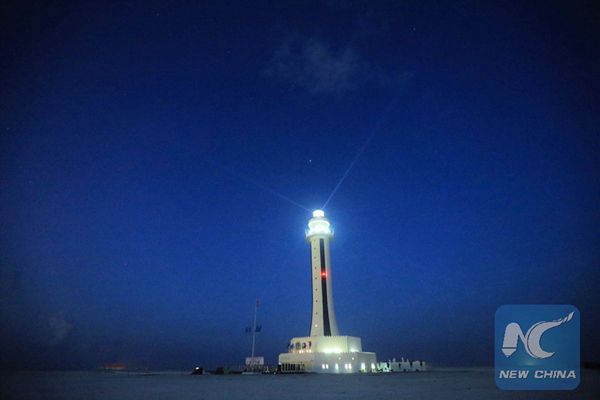Beijing issues warnings ahead of tribunal decision
 0 Comment(s)
0 Comment(s) Print
Print E-mail China Daily, July 1, 2016
E-mail China Daily, July 1, 2016
|
|
|
Photo taken on April 5, 2016 shows the lighthouse on Zhubi Reef of Nansha Islands in the South China Sea. |
China voiced stern warnings on Thursday against an arbitral tribunal that is scheduled to issue a ruling this month on a case raised unilaterally by the Philippines about the South China Sea issue.
Beijing said that the upcoming ruling may cause serious damage to the international rule of law.
The Permanent Court of Arbitration in The Hague, acting as the tribunal registry, said on Wednesday that the decision will be announced on July 12.
The tribunal was established under the United Nations Convention on the Law of the Sea (UNCLOS) at the Philippines' request.
China has refused to be part of the arbitration since it was launched in 2013, partly because it says the issues raised by Manila are related to sovereignty and maritime delimitation, which are beyond the tribunal's jurisdiction.
On Wednesday, Chinese Foreign Ministry spokesman Hong Lei said in a written statement that the Philippines' unilateral initiation of arbitration breaches international law, and the tribunal should not have heard the case or be issuing any decision.
Hong said the tribunal has no jurisdiction over the matter, as a declaration made by China in 2006 excludes disputes concerning maritime delimitation — among others — from arbitration and other compulsory dispute settlement procedures.
On Thursday, he said the tribunal "circumvented the optional declaration of exception that China has made in accordance with UNCLOS; expanded and exceeded its jurisdiction at will; and pushed forward the hearing on the relevant subject matter".
Such acts have infringed on the right of a party to the UNCLOS to choose a means of dispute settlement on its own, Hong said.
He added that it has undermined the integrity of the UNCLOS dispute settlement regime and dealt a serious blow to the international rule of law.
In early June, an international group of legal experts and lawyers signed a legal opinion document questioning the tribunal's jurisdiction.
Yi Xianhe, chief expert at Wuhan University Institute of International Law, said the tribunal has not fully considered China's viewpoints, and the legal analysis of such points has been insufficient.
"Some of the arbitrators, without any explanation, changed their previous positions and views (concerning China), and this has betrayed the consistency principle in the international rule of law," Yi said.
Wu Shicun, president of the National Institute for South China Sea Studies, said the tribunal has deliberately expanded its jurisdiction and has "drifted away" from its impartial position.
Wu said the tribunal has made its jurisdiction cover all the claims and issues raised by the Philippines, adding, "In some sense, it has become the speaker for the Philippines' interests."
According to Padraig Lysaght, an Austrian historian on South China Sea studies, "it is a principle of international law that all sides must agree on the arbitration."
"It is perfectly legal to simply not accept this award (decision). I don't think the award can solve the problem," Lysaght told Xinhua News Agency.
Cambodian Prime Minister reiterated on Wednesday that his country will not support the tribunal's decision.







Go to Forum >>0 Comment(s)